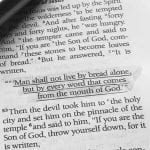Hands up if you’ve spotted or perhaps already eaten anything pertaining to Christmas. Depending on what part of the world you live in, different things signal the arrival of Christmas, arguably the most wonderful time of the year. Some put up tinsels and twinkly lights. Others don Christmas jumpers. Carols are sung and played. Mince pies – disappointingly bereft of any trace of meat – are stacked in the shops. Christmas trees make their way into living rooms. Greeting cards are exchanged. Whichever of those traditions resonates with you, there’s no missing it: the season is upon us. But what’s all the fuss about? Well, the clue is in the name.
Missing the Forest for the Trees
Christmas is a time when Christians celebrate the incarnation and birth of our Lord Jesus Christ. His arrival was the fulfilment of many long-awaited promises in the Old Testament. Christ’s birth remains the dividing point in history. So what’s not to celebrate?
We must realise that there cannot be a true celebration of Christmas without bowing our knees to Jesus Christ, the focus of the event
Well, we must admit right away that there is no biblical warrant to celebrate this momentous event on December 25th. In actual fact, the New Testament narratives strongly indicate that Jesus’ birth did not occur on this day. December 25th was actually a pagan holiday in the Roman Empire. The god Mithras was particularly celebrated on this day.
Since Christians did not want to partake of such a celebration, they chose to celebrate the most important thing in their lives in this holiday season. Following the conversion of Emperor Constantine, Christianity gained prominence, and so did the commemoration of 25th December as the recognised date for Christmas, a joyous time of celebration and worship of their God and King.
Keeping a tight grip on what Christmas really means… is harder than we tend to admit, amid its gross commercialisation and epicurean flavour
I imagine there are other explanations given for the origin of Christmas, but the above variant sounds tenable enough. Safe to say, the date has come to stay. So we might as well get on with the more important stuff: keeping a tight grip on what Christmas really means. But this is harder than we tend to admit, amid its gross commercialisation and epicurean flavour.
Frankly speaking, with all the buzz and excitement, the temptation to miss the forest for the trees is ever so real. Backtracking to the very first Christmas, we may well say, ‘As it was then, so it is now’. However, please allow for my slightly more modern twist.
It is very easy to occupy ourselves with superfluous things while missing Christmas. Mundane and less meaningful things occupy our time and Christ is squeezed out
The Preoccupied Innkeeper
Bethlehem was buzzing with everyone with any ancestral link to David, which was why Mary and Joseph went there in the first place (see Luke 2:1-5). This surge meant that whatever hospitality they may have sought or anticipated, it was unfortunately not available to them. Not in the least in the inn (Luke 2:7). The Bible does not say much about the ‘innkeeper’, but it would seem that the legitimate business of caring for other guests – rather than hostility or indifference – snuffed out the privilege of witnessing the maiden Christmas under his own roof.
Unwittingly, the pleasure, passion, parties, preoccupation and presents upstage the essence of the event
In a similar fashion, it is very easy to occupy ourselves with superfluous things while missing Christmas. Mundane and less meaningful things occupy our time and Christ is squeezed out. Though it’s typically a holiday it also contains more distractions than the rest of the year. Unwittingly, the pleasure, passion, parties, preoccupation and presents upstage the essence of the event.
Herod: The Fearful King
Unlike the innkeeper, Herod was not ignorant of who the new baby was. He possessed the right information. However, he had no room for Christ because he was fearful of another king toppling his brutal reign. Why else would a powerful leader be unsettled by the news of a humble birth?
Jesus’ coming was a show-stopper, with far reaching implications for the whole cosmos
Perhaps, there are no more kings like Herod who publicly slaughter children en masse. But that is not to say that there are no heirs competing for the throne of many a heart. Some miss Christmas for fear that another king would dethrone their own lords, such as: career, position, power, ambition, plans, and lifestyle. Others settle for a Christ that keeps them out of hell, but not so much as to crown him Lord. Unsurprisingly, our post-Christian world is teeming with people who insist that they will not have this man reigning over them. And while that excludes the insanity of Herod, the underlying reason remains the same: jealous fear. We must realise that there cannot be a true celebration of Christmas without bowing our knees to Jesus Christ, the focus of the event.
The True Christ of Christmas
There is more to be said of the other subtle ways in which many missed the first Christmas. We hear echoes of them today. But a more helpful closing will be to shine a spotlight on the true Christmas agenda. “She will bear a son, and you shall call his name Jesus, for he will save his people from their sins” (Matthew 1:21). Without a doubt, Jesus’ coming was a show-stopper, with far reaching implications for the whole cosmos. He came to seek and save the lost. Quite apart from a supplementary add-on, Jesus’ birth was instrumental in reconciling sinners to a holy God. Fittingly so, we echo the song of the herald angels, proclaiming “Glory to the new born King! Peace on earth and mercy mild, God and sinners reconciled”.
Secular culture is relentless in selling us a veneered version of Christmas
Secular culture is relentless in selling us a veneered version of Christmas. We need not buy it; rather, in light of all of our subjective responses to Christmas, it is appropriate that we take a moment to thoughtfully consider the Christ at the centre of our celebration, so we don’t lose the substance by grasping at the shadow.












